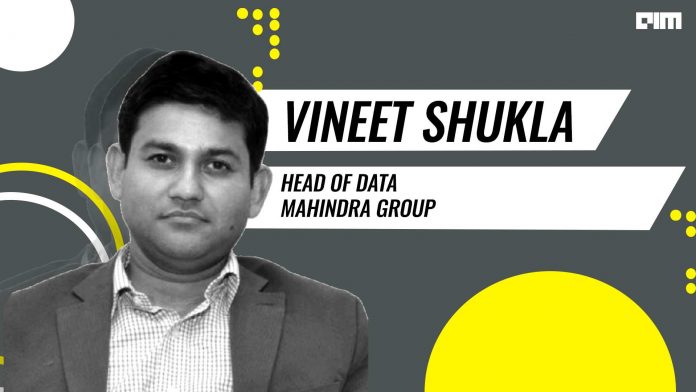Mahindra Group recently appointed Vineet Shukla as their Head of Data. Shukla has close to two decades of experience, of which he has spent a major chunk dabbling with data, AI and machine learning. He started his journey as a software engineer before doing an MBA from IIM Bangalore in business analytics. Before Mahindra Group, Shukla worked as the senior director for data science and machine learning at UnitedHealth Group, where he led the team and built an AI/ML practice from the ground up.
Analytics India Magazine caught up with Shukla for a detailed interview.
Edited excerpts:
Vineet Shukla: Even when I was a software engineer, I used to work on tweaking algorithms. Owing to my deep interest in mathematics, I could make a smooth transition to data science. In this field, I got the opportunity to conceptualise and design a few ‘big data’ solutions that have helped organisations leverage their potential information assets to gain insights, leading to more efficient, effective, and competitive business decisions. I have collaborated with many key stakeholders (globally) in my career and built analytical solutions on big data, using state of the art tools and technologies (e.g. BigQuery, MapReduce, Hadoop/Hive, R, NLP, Tableau, etc.)
As an AI and machine learning practitioner, I have built a world-class team with many models in production, leveraging economies of scale for ML, MLOps, and AI practice. I also produced multiple patents and counting. I have also been playing the role of brand ambassador, mentor, and collaborator. I have been using my knowledge and experience at different events and channels (India, US, Dubai, and others).
At Mahindra Group, as the Head of Data, I am responsible for strategising, architecting, and delivering big data or data science enabled analytics to businesses across the different group companies. I am also involved in defining and driving the data strategy that can support a variety of industry value scenarios by leveraging big data analytics and data science technologies.
Vineet Shukla: There are two mantras. Firstly, when we are involved with data analytics, we need to make sure the insights that we retract from data analytics are actionable. When you are trying to create something, and there are no insights, you will not be able to execute it. Secondly, the insights should either create a business value that clogs more revenue or optimise the underlying process, thereby reducing the cost.
Vineet Shukla: Most importantly, companies should possess clear objectives inclined to the needs and wants, rather than diving headfirst into solving specific problems. Many companies do the latter and invest a lot in establishing data CoEs; this way, the ROI is majorly hampered. You do not have to start with specific problem statements but having a good vision of what the company would be doing with this data is a good point.
Companies should always look for an early win. This is particularly true for startups that should ideally focus first on customer acquisition and revenue generation. Prioritising solving the low-level set of problems with confidence rather than trying to build a whole ecosystem has two benefits. Firstly, it is easier to assess how the company is progressing, and, secondly, it also gives a good confidence boost.
Vineet Shukla: On the challenge front, identifying and retaining good talent is very crucial in data analytics. Challenging people with a new set of problems continuously and ensuring that they stay motivated will play a huge deal in managing data analytics. Companies must pay more attention to data acquisition strategy in incrementing, selecting, and restoring the data. Furthermore, the quality of the data must not be compromised. If the data is unacceptable, insights that you receive from those data can become unreasonable.
Vineet Shukla: Data democratisation is important. However, it should not be introduced in a free-flowing data system. This means that not everybody must be able to access the data; this is very important, especially in the case of critical fields like healthcare and finance. Instead, the companies must focus on building strong governance and culture in place, which may or may not be driven by rule. Companies need to ensure that the data that is out there is being used by trustworthy groups to avoid any malpractice. In short, ethical usage of data plays a pivotal role.
Vineet Shukla: I would say, get into fundamentals and get them right. Learn the crux of machine learning. Having statistical and engineering knowledge about data science can be helpful. A strong foundation in the fundamentals of machine learning, data engineering, and statistics will help you face the competitive world.
Once individuals enter the field, they should spend time and effort understanding the fundamentals and how their solutions would be put to use. One must be objective enough to know how much their model saves; doing a cost-benefit analysis could be a good approach.
Vineet Shukla: I believe a machine learning enthusiast would greatly benefit from an influencer like Andrew Ng. One can also access materials from Coursera and upGrad for a better understanding.
Vineet Shukla: The process of converting large amounts of unstructured raw data that are retrieved from different sources that could be useful for organisations forms the core of big data. And I think big data is something that is often misused. More focus needs to be given to quality and the relevancy part of it.
Stay Connected with a larger ecosystem of data science and ML Professionals
Discover special offers, top stories, upcoming events, and more.
Stay up to date with our latest news, receive exclusive deals, and more.
© Analytics India Magazine Pvt Ltd 2021






